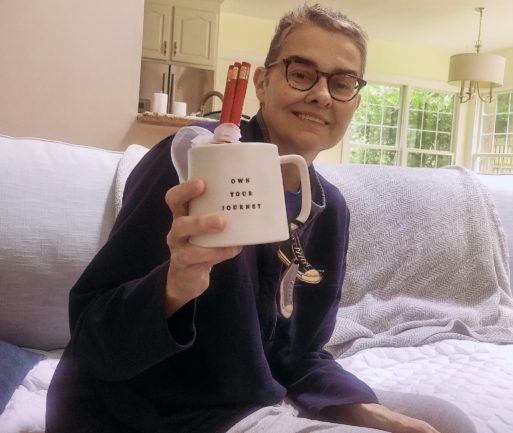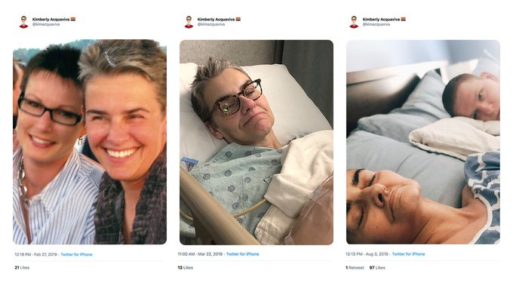
“Documenting Death” gave greater purpose to the end of Kathy Brandt’s life.
At age 54, Kathy Brandt was diagnosed with late-stage ovarian cancer. She knew that treatment would be futile against this aggressive beast. Documenting her struggles on social media would grant her hope. A short film, “Documenting Death,” would further grant those struggles purpose. Kathy was a wife, partner, mom, colleague, and friend. And in her final days of life, Kathy Brandt became a teacher to us all.
Kathy and her wife and partner of 18 years, Kim Acquaviva, were both long-time professionals in the hospice and healthcare industry. Neither was a stranger to death. They unanimously agreed that recording what it looks like to be dying might help to counter the cultural stigma associated with it. The couple’s Twitter crusade caught the attention of The New Yorker. Filmmaker Sara Joe Wolansky later compiled their social media video snippets along with subsequent interviews to create the documentary film on YouTube. Kim states in the film, “If we don’t share that stuff, then that’s why people think end of life is such a mystery.”
“Documenting Death” by Sara Joe Wolansky has nearly half a million views since its debut in June. Although the film is less than twelve minutes in its entirety, it highlights both good days and bad in the six months leading up to Brandt’s untimely death. The short film is reflective, real, and very raw at times. And there are meaningful and poignant moments. At one point, Kim puts on an adult diaper in solidarity with Kathy as she encourages her to urinate, promising to pee too. In the final hours of Kathy’s life, there is a dark and shaky video that depicts what is often called “the death rattle.” The video captures the sound of Kathy’s breath as it gurgles in the darkness. There are also post-mortem photos of Kathy taken by Kim moments after she died on August 6, 2019.

Kathy Brandt and her partner, Kim Acquaviva, shared intimate photos and details of Kathy’s dying days on social media
The film may be too much to handle for someone who has recently lost a loved one or anyone that is currently caring for someone at the end of their life. Overall, the response has been positive and supportive of the couple’s efforts to educate the public and normalize death. Viewer comments include thankful, touching, necessary, inspiring, illuminating, brave, and heartwarming. One viewer writes, “This is exactly what people need to see.” Others chose to financially support the couple’s GoFundMe page created by a friend.
Kim Acquaviva further employs this opportunity to underscore her mission to improve LGBTQ-inclusive hospice and palliative care. Acquaviva is a revered speaker, consultant, and author on the subject.

 “Documenting Death” by Sara Joe Wolansky
“Documenting Death” by Sara Joe Wolansky


 “Help Me, Helen”
“Help Me, Helen”
 Recovering Cremation Remains After the Los Angeles Fires
Recovering Cremation Remains After the Los Angeles Fires
 “As Tears Go By” by Marianne Faithfull
“As Tears Go By” by Marianne Faithfull














